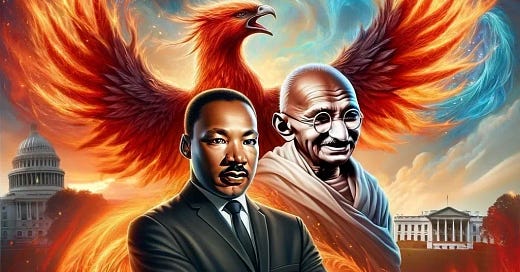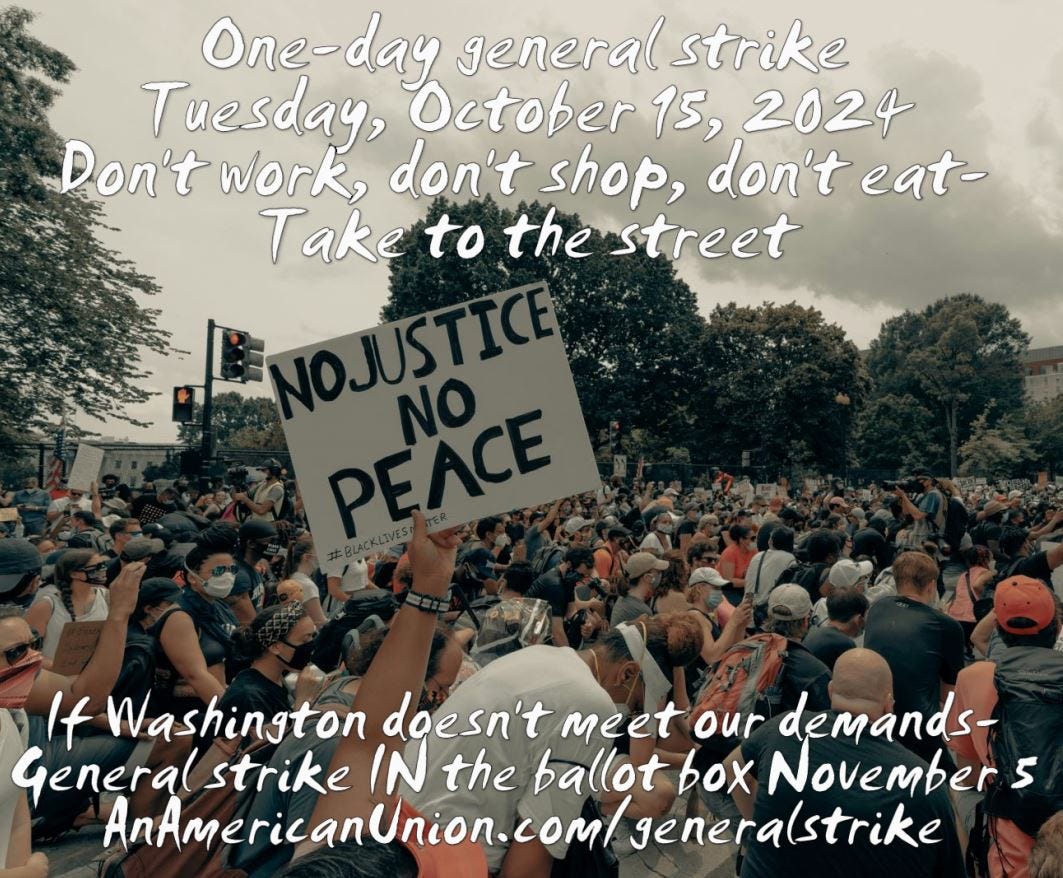On July 4th, the United States celebrates the beginning of the American Revolution. The Declaration of Independence threw down a gauntlet at King George III; Thomas Jefferson’s document is peppered with words and phrases like “tyrant,” “absolute despotism,” and “injuries and usurpations.” The united states held their “British brethren” to be “enemies in war,” and the first enumerated power for these “free and independent states” was to levy war. When the years of fighting stopped, both sides held a grudge, and went back to war three decades later.
Contrast this to Gandhi’s letter to the British viceroy leading up to the 1930 Salt March. “Dear Friend,” it begins, announcing the impending civil disobedience campaign and suggesting ways it could be avoided. His tone remained respectful and gentle. “My ambition,” Gandhi explained, “is no less than to convert the British people through nonviolence, and thus make them see the wrong they have done to India. I do not seek to harm your people. I want to serve them even as I want to serve my own.” More than 75 years after independence, the India and Great Britain are still friends.
The 2024 election is complete madness
Four months before the general election, presumptive presidential nominees Donald Trump and Joe Biden prepare to lead their political parties into battle. Words and phrases like “tyrant” and “absolute despotism” feel right at home among the campaign rhetoric, and the country is terribly divided as a result. One historian observed, in the quaint old days before the 2016 election:
[W]orse, politicians occasionally accuse rivals of deliberately trying to harm their own country—a charge so destructive to group unity that most past societies would probably have punished it as a form of treason. It’s complete madness…1
One side effect of democracy is that wars are generally fought to the point of annihilation. While a king could make a cost-benefit analysis that a given conflict had reached the point of diminishing returns and unilaterally change course, the passions of the citizenry (which must be aroused in order to justify the bloodshed) can not be altered with such ease. Elected leaders find themselves propelled onward by the wave of demonization they have often assisted in unleashing.
Appealing to the crowd for recognition of the other-color party’s humanity can be a recipe for electoral suicide. How is that good politics?
(Read more: Vote with Radical Love in 2024)
Politics is a strange game
We’ve forgotten—or been distracted from—what politics is really about. It’s about setting policy, not a team sporting event. Guiding national policy is the primary responsibility of Congress—not the Supreme Court or the President. They are the legislative branch, and they’ve tied themselves into a knot, in large part to the extreme polarization. When the other party is the enemy, bipartisanship is treason, so very little gets done.
This is a stupid way to steer policy for the wealthiest and most powerful nation on the planet.
For decades, we’ve put up with this division and ginned-up anger because… why, exactly? When one party persuades a plurality of the electorate they are the lesser-of-two-evils on election day, does it resolve things in a meaningful way? Or does the other-color team immediately begin gearing up to fight the next election?
I’m reminded of Joshua, the AI in Wargames who plays out a multitude of global thermonuclear war scenarios. “A strange game,” he concludes, “The only winning move is not to play.” His logical cost-benefit analysis prevents a pointless war. And that’s what the American Union offers in 2024; a winning move that does not take sides in the pointless war that masquerades as politics.
Dear friend
The American Union, like Gandhi’s Salt March, is a satyagraha campaign. Its ambition is to convert Congress through nonviolence, and thus make them see the wrong their inaction has done to the United States. However, Gandhi relied solely on moral power and took decades to achieve his goal. The American Union has another tool which accelerates the process; politicians who do the cost-benefit analysis and conclude not cooperating with the American Union would be electoral suicide.
The American Union is a national union of swing voters—citizens willing to vote for both Republicans and Democrats—with a concrete set of legislative demands for Congress. Named for the presidential candidates, the Trump–Biden Peace Plan delivers the policy work that the United States needs, and addresses what Martin Luther King Jr. identified as the triple evils of poverty, racism, and militarism. It is summarized under three planks:
End poverty with unconditional basic income (UBI) of $1,400/month for adults, plus $467/kids; a public option for health insurance; and 18 weeks of paid family leave.
End mass incarceration by reevaluating our criminal justice with police reforms, prosecutorial reforms, and prison reforms.
End the endless wars by reducing military spending and improving our moral standing on the world stage.
(A summary can be read here, or a PDF with the full legislative text can be found here.)
A royal road to nonviolent revolution
The American Union is built on King’s principles of nonviolence, and uses the four steps of a nonviolent campaign that he laid out in his Letter from Birmingham Jail. First, the American Union collected the facts around injustices (the triple evils) and determined a set of legislative solutions. Then, the Trump–Biden Peace Plan is given to Congress with an invitation for negotiation; members have until Labor Day to propose amendments, after which a final version will be published.
Another step is self-purification, and utilizes Gandhi’s tactic of fasting. A fast for peace (water only for 24 hours, on the 15th of each month) represents a willingness to give up partisan politics, at least temporarily, in order to advance policy positions. It culminates October 15—Muster Day—with all citizens willing to pool their votes around immediate passage of the Trump–Biden Peace Plan uniting in the fast and staging a one-day general strike.
Endorsement are made in all federal race, depending on what candidates and Congress do, and on November 5, the American Union takes direct action and votes as a bloc to decide the election outcome.
(Read more: A General Strike Against Partisan Politics)
The general strike is a hartal
During his nonviolent war of independence, Gandhi popularized the use of hartals to unite and focus the people of India. It is a mass protest, shutting down the economy for a single day, as a way of protesting injustice to the government. He laid out three components:
Adults, unless there are health or religious concerns, should observe a 24-hour fast from the previous night’s dinner.
Non-cooperation with the economy: no shopping or spending; markets and other business should close to demonstrate support. (Obviously, there’s an exemption for essential work. but those who can should request the day off.)
Public gatherings should be held, and the people’s representatives should be notified of their demands.
To summarize in rhyme: Don’t work, don’t shop, don’t eat—take to the street!
(Learn more at AnAmericanUnion.com/generalstrike)
Converting Congress with love and game theory
Tuesday, October 15 is exactly three weeks before the general election—the time when politicians and parties are most sensitive to the whims of the voters. All candidates for federal office are invited to publicly come forward and join the demand immediate passage of the Trump–Biden Peace Plan. Congressional incumbents who do AND and successfully pass it within one week are guaranteed the American Union endorsement. It doesn’t matter what errors they’ve made in the past; everyone is worthy of redemption.
However, should Congress refuse to act, endorsements will go to any major-party challengers who took up our demand on October 15. Instead of Republican vs. Democrat, this reframes the election as incumbent vs. challenger. (Should both refuse, the endorsement may ultimately be made at random.)
Nationwide, it is tens of thousands of swing voters who determine which political party controls the House, Senate, and Oval Office. That leverage can be used to inspire politicians and parties to work together for the good of the people of the United States before the election, precisely because candidates know that the American Union bloc of swing votes will go to one of the top two candidates. A basic cost-benefit analysis reveals that supporting the Trump–Biden Peace Plan always helps their odds of winning, while refusing may cost them their office.
Conclusion
Nearly 250 years after the Declaration of Independence, the people of the United States can declare their independence from political parties. By unionizing as voters around specific policy objectives, they can restore functionality to Congress and transform the way the government is managed. As Gandhi and King recognized, persuasion is the best way forward.
(Learn more: Open Zoom meetings are held twice a month. RSVP on this page.)
Join the nonviolent revolution by becoming a member of the American Union today… and mark your calendar for October 15!
Tribe: On Homecoming and Belonging (Sebastian Junger, 2016) p.125






It's a lovely plan, and I wish you well; but the simple fact too many don't seem to see is that this November is a turning point. If the managed democracy run by the oligarchy using the two legacy political parties to limited voter choices once again succeeds, the republic is done. Over. Kaput. The Koch-owned GOP's legislative lobby ALEC is within 5-6 states of calling an Article V convention, at which the intent is to gut the Constitution and replace it with an updated version of the Articles of Confederation. Cf. https://newrepublic.com/article/178442/republicans-rewrite-constitution-radicalism-beyond-trump
The legacy alternative, then, is the Democrat Party, which Bill Clinton sold to Wall Street and corporate interests in 1992, and the governing body of which, the DNC, is composed of corporate executives and lobbyists whose main criterion for an acceptable candidate is that they accept unwavering servitude to corporate interests.
There are the Greens, but only their loyalists consider them an actual political party rather than mainly a social club for academics, intellectuals, and those who consider it a measure of moral rectitude to vote for someone who says all the right trigger words.
This year, however, there is a real, viable third option, if we can keep him safe and alive. No, I'm not joking. I'm old enough to have listened as a news announcer on my local radio station told me his uncle was murdered in Dallas,and just a year shy of voting age when his father was murdered. I am all too aware there are no limits to what people will do to keep their grip on power.
Still, for now, the battle is one of words—disinformation, innuendo, and outright lies so ludicrous they're revelatory of just how deep runs the contempt the power elite has for We the People. It's their biggest weakness, because the fact is Robert Kennedy Jr. is drawing his voter base from the people still capable of exercising their critical thinking skills, and are prepared to respond to propaganda and trolling with facts. His The Real Debate on 27th June, had as many or more viewers that the performance art on CNN, and they heard something long missing from US politics. Instead of meaningless weasel-word promises, they heard facts and specific actions to be taken from someone with 40 years of experience fighting swamp creatures.
I watched our dream for a future of peace and equality and a thriving people die in 1968. If this is our last chance to get it back, I want to be able to tell my grandchildren I fought as hard as I could to make it happen.